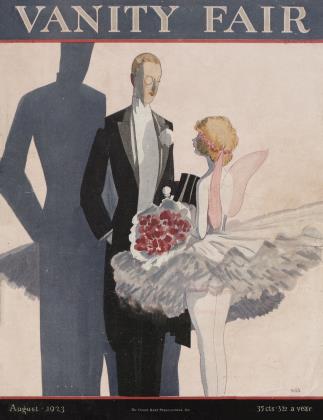Sign In to Your Account
Subscribers have complete access to the archive.
Sign In Not a Subscriber?Join NowTwo Cynical Tales: How Truth Is More Disappointing Than Fiction
BERTRAM BLOCH
I. The Cynical Tale of the Man Who Let His Wife Go Free
ONCE upon a time there was a man who went to the theater a great deal, and therefore was well-informed about life. His name was Robert L. Little.
The life of Robert L. Little was uneventful until the night he missed his train to Chicago and returned home to find his wife in the arms of another man.
His wife shrieked as he entered.
"You needn't be alarmed", said Robert, sadly. "I am a civilized man."
"I'm not a wicked woman, Robert!" she cried. "Before God I'm not! I love him."
"You no longer love me?" asked Robert, skeptically.
"I love you too, Robert, but not in the same way. It's so hard to explain. You will let me go, won't you? You won't hold me?"
"Hold you! Of course, I'll—" Then he remembered. Women turn to other men because they resent the bonds of matrimony; cut those bonds, and they invariably return to their husbands. They all do on the stage.
"My dear", he said, calmly, "you have been fettered. With one gesture I shatter your bonds. You are free!"
"You hear that, James", cried the woman, turning to The Other Man. "He makes no demands. Oh Robert, how good you are! I never realized what a great heart you have."
The woman choked back a sob. "Come", she cried suddenly. "I'm going to cry!"
They went, leaving Robert L. Little tapping his fingers together with satisfaction. It was only a matter of minutes until she'd be back.
That was sixteen years ago. He received a letter from her the other day, telling of her son's election to the captaincy of the highschool baseball team. "But for your generosity", ran her letter, "this could never have happened."
II. The Cynical Tale of the Man Who Knew His Psychology
ONCE upon a time there was a man who went to the theater a great deal, and therefore was well-informed about life. His name was Horace P. James, and his life was uneventful until he set out for Europe.
Horace P. James was a social sort, and didn't like the lonely ocean and the lonelier sky; so he spent most of his time playing bridge.
He lost. Now Horace considered bridge one of his major accomplishments, and this irritated him.
Mortification ate into his soul. In one way only could he account for his ill-luck. He watched his fellow-players narrowly, and discovered that one, a thin-faced man from New Orleans, knew more about the backs of the cards than a gentleman should know.
The night he lost four in hearts redoubled, he spoke wrathfully.
The gentleman from New Orleans sprang at Mr. James' throat, but James weighed two hundred and twenty.
In a moment the Southerner was up, a revolver in his hand.
"You hound!" he shouted. "Apologize, or I'll shoot!"
But Mr. James was a stubborn man.
He must be calm. It was coolness that won in such situations. How often on the stage he had seen angered men falter and drop their weapons before a steady eye and calm, unhurried speech.
"You won't shoot," said Mr. James, slowly, confidently. He lit a cigarette.
The man was disconcerted; the hand holding the revolver shook.
"I'll give you three seconds," blurted the Southerner. "Just three—Then I'll shoot!"
"You won't shoot," repeated Mr. James. "You can't shoot! You—can't—even—hold— that—gun!"
A smile started to his lips. It never arrived. A bullet stopped it.
 View Full Issue
View Full Issue
Subscribers have complete access to the archive.
Sign In Not a Subscriber?Join Now